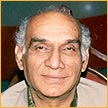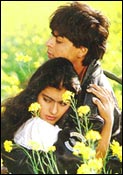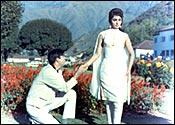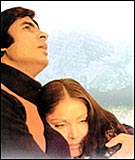
|
The Rediff Movies Special/ Aseem Chhabra
The man with a song on his lips
A tribute to Yash Chopra, Bollywood's most prolific filmmaker, on his birthday
|
The year 1959 was crucial in the history of Indian cinema. Three major films released that year --- Kaagaz Ke Phool, Guru Dutt's semi-autobiographical work, critically acclaimed but a box-office failure; Apur Sansar, Satyajit Ray's last installment in the Apu trilogy; and Sujata, Bimal Roy's classic melodrama about a love affair between an upper caste Hindu and an untouchable woman.
Two years earlier, Mehboob Khan's Mother India was nominated for the best foreign language film Oscar.
In 1959, a young assistant director in the Mumbai film industry decided to step out of his elder brother's shadow and establish himself as a filmmaker. His first film, a social melodrama, Dhool Ka Phool, starring evergreen hero Rajendra Kumar with Mala Sinha, Nanda and Ashok Kumar, was a story about an illegitimate child trying to reclaim his history.
The film was also a call for communal harmony (one of its hit songs is Mohammed Rafi's Tu hindu banega na Musalman banega), an issue of great importance to a young nation, which had witnessed its worst-ever religious strife only 12 years before.
The young filmmaker Yash Chopra was 27 years old. Dhool Ka Phool was a big success at the box-office.
Forty-three years later, on September 27 (his birthday), Chopra is by all accounts the leading filmmaker in Bollywood. His career, studded with 20 films he directed, include classic works Waqt, Ittefaq, Deewar, Kabhi Kabhie, Chandni all the way to the contemporary musical hit of 1997, Dil Toh Pagal Hai.
He has guided the careers of superstars --- from Amitabh Bachchan's angry young man launch in Deewar to Shah Rukh Khan's hit negative role in Darr. And he has blessed the careers of his two sons: Aditya, 32, who directed Dilwale Dulhania Le Jayenge (1995) --- the biggest hit for his father's production company --- and Uday, 29, who was introduced as one of six newcomers in Aditya's second film Mohabbatein (2000).
"When a man starts his career, he does not think where the future will take him," Chopra says, reflecting on his 50 years in the Hindi film industry. "He doesn't think his films will be box-office hits, or he will get married one day, or have children who will join the film industry."
"Mahabharat mein kehte hain ke Arjun ki aankh machli par nahin thi. Arjun ki aankh machli ki aankh par thi [It is said in the Mahabharata that Arjun's eye was not focused on the fish, but rather on the fish's eye]. I had focus. All I wanted to do was to make good films.
"I had assisted my brother B R Chopra for years and I wanted to make my own films," Chopra says. "With God's grace, I did succeed. People came to help me, and my brother was a father figure to me."
Apart from his brother, Chopra says three other filmmakers --- all of whom were senior to him --- influenced him.
"Guru Dutt died in 1964 while we were making Waqt; Mehboob [Khan, director of Mother India] Saab died after that, around the time Pandit [Jawaharlal] Nehru died," he recalls. "And Bimal Roy died a year after Waqt was released. All of them influenced me a lot."
For Chopra each film is a landmark and memorable experience, he breaks his life into three milestones. The first is the release of Dhool Ka Phool.
"Then after a few years I decided to fly on my own wings," Chopra says referring to the establishment of the Yash Raj Films banner. Daag, a 1973 romantic melodrama with several twists and an ending that could only work in a Hindi film, was the new production house's first venture.
The film starred the top actors of the early 1970s: Rajesh Khanna, Sharmila Tagore and Raakhee.
 "After that, the third milestone is when my son Aditya directed Dilwale Dulhania Le Jayenge," he says. "The film turned into a huge hit and is still running in Mumbai after seven years."
"After that, the third milestone is when my son Aditya directed Dilwale Dulhania Le Jayenge," he says. "The film turned into a huge hit and is still running in Mumbai after seven years."
Chopra recalls his second film Dharamputra (1961), an overlooked black-and-white film with a strong message of harmonious ties between Hindus and Muslims. A young Shashi Kapoor (he later resurfaced in a few Yash Raj films in the 1970s), plays an illegitimate child of a Muslim woman (Mala Sinha), adopted by a Hindu family.
In an ironic twist, years later, Kapoor now a Rashtriya Swayamsevak Sangh supporter, discovers he is a product of Muslim mother.
The film had two memorable songs, Chopra says. His face brightens with a smile as he starts to hum Mein jab bhi akeli hoti hoon, a Lata Mangeshkar song pictured on Mala Sinha in the movie. The other song, he says, is Bhool sakta hai bhala kaun, Shashi Kapoor expressing his love to Indrani Mukherjee in Mohammed Rafi's voice.
About Dharamputra's black-and-white cinematography, Chopra says: "I think black-and-white photography is more natural but more difficult, more challenging to create. You have seen coloured films everywhere. When you suddenly see a black-and-white film, you immediately relate to it."
 Chopra's third film Waqt (1965) was the first multi star production of its kind in Bollywood, woven around the lost-and-found theme. Balraj Sahni played the patriarch of the family with three sons, Raaj Kumar, Sunil Dutt and Shashi Kapoor. The family, including Sahni's wife Achla Sachdev, separate following an earthquake, only to be reunited in the end after much trail and tribulation.
Chopra's third film Waqt (1965) was the first multi star production of its kind in Bollywood, woven around the lost-and-found theme. Balraj Sahni played the patriarch of the family with three sons, Raaj Kumar, Sunil Dutt and Shashi Kapoor. The family, including Sahni's wife Achla Sachdev, separate following an earthquake, only to be reunited in the end after much trail and tribulation.
The film's ending included an over-the-top dramatic court sequence, which was the hallmark of some of B R Chopra's classic films (from Kanoon to Insaaf Ka Tarazu). Also in the cast were Sharmila Tagore and Sadhana, love interests of Sahni's sons.
The film featured the hit Manna Dey song Aye meri zohrajabeen. In the film Sahni sings the song to Sachdev, his wife.
Thirty years later, in 1995, Chopra's son Aditya paid homage to his father's career by using the same song in Dilwale Dulhania Le Jayenge. This time, as Amrish Puri sings the song to his wife Farida Jalal, Aditya added another nostalgic touch --- the camera captures Puri's ailing mother (played by none other than Achla Sachdev), looking all too coy as if she were back in days of Waqt.
In addition to the melodrama of Daag, Chopra's career in the 1970s was defined by the powerful dramatic scripts written by Salim Khan and Javed Akhtar. The themes were not novel, but the approach --- angry confrontations between fathers and sons (Trishul, 1978) and between brothers (Deewar, 1975) had a tremendous mass appeal. In the process Chopra also defined the angry young man image of Amitabh Bachchan. In 1973, the struggling actor had played the role of an angry cop in another Salim-Javed scripted film, director Prakash Mehra's Zanjeer.
"He had had eight or nine flops and he was considered a negative artiste, when I decided to cast him in Deewar," Chopra says about Bachchan. "He was thinking of returning to Allahabad. We don't make films for anybody. We cast Amitabh because the role suited him. Everybody has to be new one day. One cannot always cast big artists in movies."
 A year later, Chopra surprised audiences by showing a softer side of Amitabh Bachchan's personality, a romantic poet who has to adjust to a new life when he cannot marry the woman of his choice. By all accounts Kabhi Kabhie is one of the most romantic films made in India.
A year later, Chopra surprised audiences by showing a softer side of Amitabh Bachchan's personality, a romantic poet who has to adjust to a new life when he cannot marry the woman of his choice. By all accounts Kabhi Kabhie is one of the most romantic films made in India.
Chopra says the title song in the film sung by Mukesh and also by Lata Mangeshkar is his favorite. "There are two versions of the song," he says. "It was originally written for a book recital, but it came off very well as a thought. It was a new concept and the song has become immortal."
In the 1980s, Chopra moved away from the loud booming scripts of the Salim-Javed team. (After two decades, Chopra recently reconnected with Javed Akhtar who wrote the lyrics for Yash Raj Films' latest production, Mere Yaar Ki Shaadi Hai).
The much-hyped Silsila, a romantic triangle with Bachchan, wife Jaya and Rekha played on the real life tale of the three stars that was staple for gossip film magazines. Unfortunately, the audience did not take to the movie.
In the late 1980s Chopra directed Sridevi --- the top actress of the time --- in Chandni and Lamhe. The two films were rich with melodious songs and stunning locations - from the rolling hills of Europe to the barren desert landscapes of Rajasthan. Chandni was a big hit, while Lamhe's story line did not work well with the audience in India.
The 1990s saw Chopra once again adapting to the changing times. He cast a relatively successful actor --- Shah Rukh Khan as a stalker and an obsessive lover in Darr. As Khan became a star sensation, Chopra cast him again in Dil Toh Pagal Hai. He also appeared in the two films directed by Aditya Chopra.
Soon, Chopra will commence a new project, his 21st film, and his first creative collaboration with Aditya. He denies news reports that he flew all the way to Florida to convince Madhuri Dixit to act in his new film.
"Aditya has not written the script yet," he says. "I don't go to anybody to read them the story. She [Madhuri] is a very nice person apart from being a good artiste. I have talked to her about working with her again. But she has to fit the story."
He may also consider casting his son Uday in the next film. "Why not?" he asks. "My son is a very good actor. So if the role suits him, why not?"
Today, Chopra is 70. But he is showing no sign of slowing down.
"I always look forward. Never look back. I like to make films and I always think about films. I always say I would like to die with a good song. We have made this thing work. We started this journey and it has been a very interesting journey."
This article first appeared in India Abroad